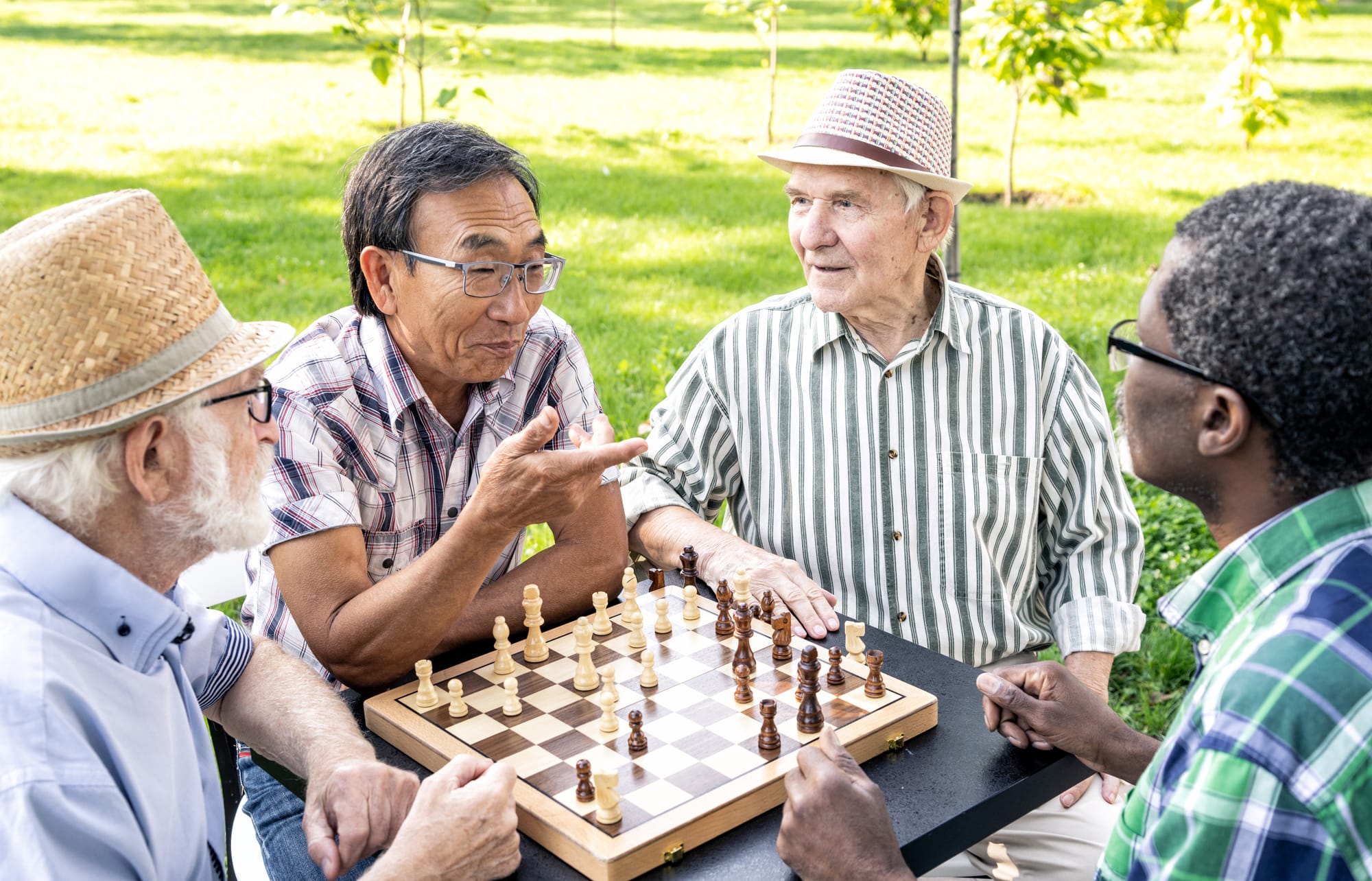From Challenges to Comfort: Palliative Care for Dementia Patients
Practical ways palliative care makes life more comfortable for dementia patients, addressing their physical and emotional needs with care.
Aging well is within reach with the right habits and insights. This guide to healthy aging covers essential practices like staying active, eating well, managing stress, and nurturing relationships.

As we grow older, the notion of health often broadens. It moves beyond the traditional goal of “staying fit” or thin and enters a realm where physical vitality, mental clarity, relationships, and a sense of purpose become areas of focus. Aging well isn't simply about avoiding illness, as it can sometimes be inevitable. It's about making sure that you are living on your own terms, and not taking actions that will cause suffering down the line. While certain factors—like our genes—lie beyond our control, many elements of healthy aging are within reach and can be guided by our choices and habits.
Research, including studies funded by the US Centers for Disease Control, suggests a clear path forward: small, intentional changes in our daily routines can help us stay healthier and maintain our independence. Simple acts add up, like counting the steps we take each day, carefully choosing the foods we eat and the connections we reach out to, have a considerable impact on our overall health. Healthy aging is a blend of the physical parts you can see and touch and the emotional that you feel, and taking steps to combine these so that you have a life worth living.
Let’s dive into these key areas, exploring physical, mental, and cognitive health, as well as the powerful role relationships play in aging well.
Our bodies change as we age, but research has shown that we can stay physically resilient, often well into later years, by making consistent, proactive choices. By tending to physical health—through movement, balanced eating, restful sleep, and regular health check-ups—we give ourselves the best chance to live long, fulfilling lives with minimal discomfort. Here’s a look at the main pillars of physical health in aging.

Movement is a cornerstone of healthy aging. Not only does regular physical activity improve longevity, but it also contributes to quality of life—years lived with less pain, fewer physical limitations, and greater independence.
Consider these insights: Studies show that adults over 60 who walk around 8,000 steps a day reduce their risk of mortality from all causes by over 50%. But achieving this doesn’t necessarily require a gym membership or a rigorous regimen. Small adjustments, like opting for the stairs, gardening, or taking a daily walk, can keep us active and able to continue walking for longer.
Maintaining Muscle and Mobility
Muscle mass tends to decline with age, which can sap our energy and limit our independence. This age-related decline in muscle mass and function is called sarcopenia. Sarcopenia is characterized by the progressive loss of skeletal muscle mass, strength, and function that occurs as part of the natural aging process.
Regular physical activity, particularly moderate to vigorous exercise, has been shown to support muscle function across all ages. Strength-building exercises, whether light weights or resistance bands, are beneficial for keeping muscles strong, preventing falls, and improving balance. In fact, in a recent study with adults over 55, muscle mass was found to be a stronger predictor of longevity than body weight or BMI.
Tips for Getting Active
Beginning an exercise routine can be as simple as setting aside time for short walks or trying activities like yoga or tai chi, which promote both physical and mental well-being. And while many think of exercise as draining, it often becomes energizing over time—a refreshing boost rather than a something you have to do. The key is consistency and finding motivation through enjoyable, sustainable activities. Remember, if you don't find the time to exercise or move around, eventually you won't be able to.

Eating well is more than just a means to manage weight. It’s a way to support every system in our body, from bones and muscles to the brain. Research suggests that specific eating patterns, like the Mediterranean diet—which emphasizes fresh produce, whole grains, healthy fats, and lean proteins—are associated with longer life spans and better overall health.
Dietary Approaches to Support Aging
The Mediterranean diet and the DASH (Dietary Approaches to Stop Hypertension) diet both prioritize nutrient-dense foods, which are proven to support cardiovascular and brain health. For instance, the MIND diet, a blend of Mediterranean and DASH principles, has been linked to reduced cognitive decline. Choosing fresh foods over processed options, incorporating healthy fats, and opting for high-quality proteins like fish and legumes all contribute to a diet that supports healthy aging.
Practical Steps to Healthier Eating
You don’t need to overhaul your diet all at once. Consider introducing more leafy greens, swapping sugary snacks for fresh fruit, or adding fatty fish like salmon to your meals. Even small, gradual shifts can lead to lasting changes in health outcomes. For instance, a study found that simply increasing leafy greens was associated with slower cognitive decline in older adults.

Adequate sleep plays an irreplaceable role in maintaining our mental sharpness, physical health, and emotional stability. While the need for seven to nine hours of sleep each night doesn’t change with age, older adults often find it harder to get enough rest due to changing sleep patterns or issues like pain and medication side effects.
Why Sleep Quality Matters
Studies show that poor sleep in older adults is linked to increased risks of memory issues, mood changes, and even physical health problems, including a heightened risk of heart disease and diabetes. On the other hand, regular, quality sleep supports immune function, reduces stress, and improves decision-making skills.
Tips for Better Sleep
Adopting good sleep hygiene—such as setting a consistent sleep schedule, reducing caffeine intake, and engaging in relaxing activities before bed—can significantly improve sleep quality. Regular physical activity can also help by promoting deeper rest, provided it’s done earlier in the day. Additionally, techniques like controlled breathing and meditation are shown to help manage the stresses that might otherwise disrupt sleep.

Mental health is a cornerstone of well-being, impacting how we feel, think, and connect with others. As we age, the importance of nurturing mental health grows, especially in light of changes in lifestyle, physical ability, and social networks. Mental health is not just about avoiding mental illness; it’s about cultivating resilience, maintaining emotional stability, and finding joy in daily life. Here’s how focusing on mental health can support healthier, more satisfying aging.
Humans are social beings, and the power of connection is especially profound as we grow older. Studies show that social isolation and loneliness are linked to a higher risk of heart disease, depression, and even cognitive decline. Unfortunately, changes in health, mobility, or the loss of friends and family members can sometimes make it challenging for older adults to maintain social connections.
The Impact of Loneliness on Health
A study involving over 11,000 older adults found that those who reported feeling lonely had higher rates of heart disease and depression than those with a strong support network. Beyond physical health, social isolation can affect memory, mood, and motivation, with research indicating that loneliness accelerates cognitive decline in older adults.
How to Stay Socially Connected
Maintaining and building relationships takes intention, especially when circumstances change. Try setting aside time each week for social activities, whether it’s meeting friends for coffee, joining a community group, or volunteering. Many older adults find purpose in teaching skills or mentoring younger generations, which not only offers social engagement but also brings a sense of fulfillment and legacy.

Life’s challenges don’t necessarily ease with age; in fact, they can sometimes intensify. Aging may bring about new stressors—health concerns, financial worries, or changes in personal roles. However, learning to manage stress and foster emotional stability is key to a healthy mind and body.
The Effects of Chronic Stress on Health
Prolonged stress affects our bodies and brains. Studies have found that chronic stress can alter brain structure, impact memory, and increase the risk of diseases like Alzheimer’s. Cortisol, the hormone released during stress, tends to increase with age, potentially compounding these effects. Emotional resilience—our ability to bounce back from difficult situations—can mitigate these effects and even improve life expectancy.
Practical Stress-Relief Techniques
Finding effective ways to manage stress is essential. Practices such as meditation, deep breathing exercises, and journaling can reduce stress and improve emotional stability. The effect that this can have on overall health is considerable, and is not just for your mental health. These activities can have a real effect on your blood pressure and can help reduce risk of heart attack or stroke.

Depression affects many older adults, yet it often goes unrecognized. Symptoms can differ from those in younger people; older adults may not feel profound sadness but may instead experience feelings of numbness, a lack of interest in activities, or irritability. Untreated depression can take a serious toll on physical health, affecting everything from sleep patterns to immune function.
Depression and Its Impact on Aging
Research funded by Johns Hopkins University has shown that depression increases the risk of heart disease and metabolic disorders. Moreover, repeated episodes of depression have been linked to a higher risk of developing dementia. Maintaining a positive mood, meanwhile, is associated with improved memory and cognitive control, according to a recent longitudinal study.
Seeking Help and Improving Mood Naturally
If you or someone you love may be struggling with depression, it’s essential to seek professional help. Early intervention can improve both mental and physical health outcomes. Additionally, maintaining social connections, engaging in pleasurable activities, and practicing gratitude can all contribute to a better mood. Studies suggest that holding a positive view of aging can even improve physical and mental health outcomes, as optimism enhances resilience and fosters a proactive approach to health.

Cognitive health—the ability to think clearly, learn, and remember—is central to maintaining independence and quality of life as we age. While it’s natural for certain cognitive functions to slow over time, research increasingly shows that lifestyle choices can help keep our minds sharp and potentially reduce the risk of cognitive decline. Caring for cognitive health involves more than simply “exercising the brain”; it requires a balanced approach that integrates diet, activity, mental engagement, and preventive health measures. Here’s how to support cognitive health for aging well.
Engaging in mentally stimulating activities helps maintain brain health by creating new neural connections, supporting memory, and enhancing overall cognitive function. Studies show that learning new skills, taking on challenging hobbies, and staying intellectually active can help the brain adapt, even in later years.
The Benefits of Learning New Skills
A study of adults over 60 demonstrated that engaging in mentally demanding activities—such as learning a new language, practicing an instrument, or even mastering computer skills—was associated with better memory and improved cognitive function. Unlike passive activities, these active engagements challenge the brain, keeping it agile and responsive.
Ideas for Staying Mentally Active
Activities that involve novelty and challenge are especially beneficial. Try exploring hobbies that you’ve never considered before, like photography, playing chess, or learning woodworking. Even small, daily mental exercises, like crosswords, puzzles, and memory games, offer cognitive benefits. And don’t underestimate the power of social activities; discussions, debates, and shared learning all stimulate the brain.
Preventive health measures are essential for cognitive longevity. Managing cardiovascular health, monitoring sleep quality, and minimizing risky behaviors like smoking or excessive alcohol use can reduce the risk of cognitive impairment.
Heart Health and Cognition
Studies increasingly show a strong connection between heart health and brain health. High blood pressure, for example, is a major risk factor for cognitive decline. A 2019 study suggested that intensive blood pressure control could slow brain aging and reduce the risk of mild cognitive impairment, which is often a precursor to dementia.
Avoiding Harmful Substances
Limiting alcohol and avoiding tobacco products can significantly protect cognitive health. Heavy drinking has been associated with a higher risk of dementia, and tobacco is linked to vascular issues that can harm the brain. By cutting down on alcohol and avoiding smoking, you’re actively supporting both heart and brain health.
Social interaction isn’t just good for mental health—it has cognitive benefits too. Studies have found that people who maintain active social lives tend to experience slower cognitive decline. Group activities, whether a book club, volunteer work, or joining a class, provide mental stimulation and offer meaningful interactions that support cognitive resilience.
Benefits of Group Activities on Cognition
In a 2019 study, older adults who regularly engaged with friends and family were more likely to stay physically and mentally active. Shared activities, like cooking, gardening, or playing board games with friends, can strengthen mental function and memory by introducing a social element that adds extra layers of engagement and satisfaction.
Ideas for Staying Socially and Cognitively Engaged
Participate in activities that involve interaction and shared experiences. Whether it’s joining a community group, reconnecting with old friends, or even teaching skills to younger generations, social engagement keeps your brain engaged and fosters a sense of belonging. If you’re looking for new ways to connect, consider local community centers, libraries, or online classes that encourage discussion and collaboration.

Healthy aging is an art—a blend of small, intentional habits that build resilience, vitality, and connection over time. Each of us is on a unique path, shaped by our choices and experiences, yet science tells us that by nurturing our physical, mental, and cognitive health, we’re better prepared to embrace the changes and opportunities that come with age. Aging well is about living fully, with clarity, strength, and purpose.
The choices we’ve explored are often simple yet powerful: keeping active, nourishing our bodies and minds, prioritizing sleep, seeking social connections, and engaging in lifelong learning. These actions add up, grounding us in better health and bringing a sense of joy and curiosity to our lives. Ultimately, aging well is about creating a life that feels purposeful—one that isn’t simply measured by years, but by meaningful experiences and connections.
Here are a few valuable resources to continue learning about healthy aging: